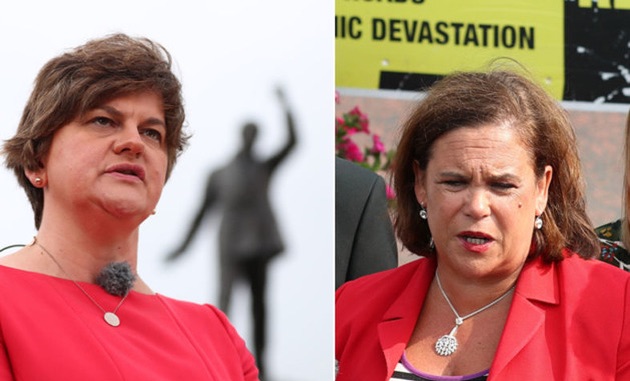
Brexit is unionism’s “biggest ever own goal” and it may lead to the break-up of the United Kingdom, former Ulster Unionist Party leader Mike Nesbitt has admitted.
Pressure is mounting for a border poll after a minority of unionist MPs was returned to Westminster from the north of Ireland for the first time since partition.
Brexit has unquestionably accelerated a process of Irish unification that some people thought could take generations.
British Prime Minister Boris Johnson’s decision in October to abandon a plan to remilitarise the border through Ireland infuriated his DUP allies, but crucially helped swing English public support behind his Tory Party and his Withdrawal Agreement.
Johnson’s deal is set to take Britain out of the EU’s Single Market and Customs Area by the end of January, while delivering a different status for the north of Ireland which some loyalists have dubbed an “economic united Ireland”.
Speaking to the BBC, Mike Nesbitt described the situation unionists now face. “The great irony of all of this is that for decades unionists have looked over their shoulders and decided that Irish nationalists were the great threat... but actually it’s English nationalism,” he said.
The leader of the Alliance Party, which doubled its vote to a 17% share in the election, said an Irish unity referendum is “almost inevitable”.
Naomi Long, who is strongly opposed to Brexit, said: “If Boris Johnson chooses to use his mandate to pursue a no-deal or a hard Brexit then it is inevitable that Scotland will push for a second referendum on independence and it is almost inevitable that there will be a push for an Irish unity referendum.
She added: “We have a prime minister who no longer cares or needs the DUP to be able to deliver the hardest Brexit that he wants to deliver and so our options are limited.”
Taoiseach Leo Varadkar congratulated Johnson on his election victory, but he warned that the result should not lead to people “racing ahead” to form a united Ireland. He said while the “tectonic plates” were shifting in the North, the focus should be reviving the Six County institutions instead of Irish unity.
He claimed the best future for the partitioned statelet should be a return to Stormont based on “based on bringing all communities together”. He said the next step in that should be getting the Six County Executive and Assembly up and running before January 13th.
The 26 County Foreign Minister Simon Coveney said the increased vote for what he described a “middle ground” parties pointed to a need for urgent dialogue. “I think we can make progress (in the negotiations) very quickly,” said Coveney, who will co-chair the talks from Monday.
Attempts to break the deadlock in Belfast have been undermined by the DUP’s role since 2017 in propping up the British government in London while working towards their vision of Brexit.
The clear result of Thursday’s election and the path it opens up for Johnson to end three years of uncertainty at Westminster should change that, Sinn Féin has said.
“Because of Boris Johnson’s majority, the DUP are going to have now to refocus on the North, on relationships with ourselves and other parties and I think that assists us in the negotiations,” said Sinn Féin’s Eoin O Broin.
“I’d be looking into next week actually much more encouraged than I might have been this time last year.”
Mr Varadkar congratulated Mr Johnson in a phone call on Friday evening. A statement by the Dublin government later said the leaders agreed “there is now a significant opportunity to restore the Good Friday Agreement institutions, and pledged to work with the Northern Ireland parties to achieve this.”
The collapse of the Stormont institutions was originally triggered by the refusal of DUP leader Arlene Foster to resign in the wake of a corruption scandal. In February last year, her party walked away from a draft deal that included legislation on the Irish language, but she has also now signalled a clear desire to restore the power-sharing Executive.
Sinn Féin President Mary Lou McDonald said the party’s negotiating team “stand ready” to bring back Stormont.
Ms McDonald said her party was entering talks prepared to “work towards securing agreement on outstanding issues”.
“Sinn Féin wants to see a successful conclusion of the talks established by the two governments and the political institutions restored on a credible and a sustainable basis.
“I and our negotiating team stand ready to re-enter talks with the two governments and the other parties on Monday and we will work towards securing agreement on outstanding issues.”
![[Irish Republican News]](https://republican-news.org/graphics/title_gifs/rn.gif)
![[Irish Republican News]](https://republican-news.org/graphics/title_gifs/harp.gif)

